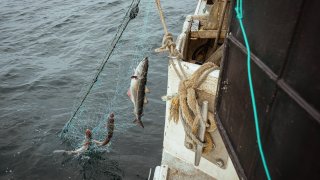
PORTLAND, MAINE, UNITED STATES – 2022/09/27: Three pollock fish caught in a gillnet fishing net being hoisted on board a commercial fishing boat off the coast of Maine. In a gillnet fishing boat, fishers haul their catch of monkfish, pollock, and cod from early morning until late at night. The fishing industry in Maine has recently taken a blow with the new set of restrictions on fishing. The environmental organization, Seafood Watch, recommends people to avoid eating American lobster. This listing and regulation poses new threats to fishers’ livelihoods. While fisherfolk argue that lines pose only a minor risk to the incidental capture of endangered species such as sharks, dolphins, lobster, and crab, bycatch is nevertheless almost inescapable. Due to regulations, fishermen will often be forced to discard animals they do not want, cannot sell, or are not allowed to keep. (Photo by Mailee Osten-Tan/SOPA Images/LightRocket via Getty Images)
A federal program that protects the health and wellbeing of commercial fishermen should be expanded to include substance use disorder and worker fatigue, a group of lawmakers from New England and Alaska said.
The lawmakers want to expand a federal commercial fishing occupational safety program that funds research and training. The program is designed to help the nation's fishermen with the often hazardous conditions they face at sea.
Republican Sen. Susan Collins of Maine, who is one of the lawmakers pushing for the change, said expanding the program would help fishermen access more safety training and mental health resources. Collins and the lawmakers introduced the proposal late last week.
“Every day, our fishermen are faced with demanding and dangerous working conditions that take both a physical and mental toll, all while they work to bring food to the tables of families across the country,” said another member of the group, Democratic Sen. Edward Markey of Massachusetts, who added the expansion would "provide much needed funding to ensure that fishermen are getting the information and resources they need to stay safe and healthy on the job.”
Get New England news, weather forecasts and entertainment stories to your inbox. Sign up for NECN newsletters.
Republican Sen. Dan Sullivan of Alaska is another supporter of the change. Alaska produces the most volume of seafood in the country, while New England is home to New Bedford, Massachusetts, the top U.S. port in terms of seafood value.
The lawmakers' proposed changes would increase the program's annual funding from $6 million to $12 million, a Collins spokesperson said. The proposal would also remove a cost share component from the program, the spokesperson said.
Commercial fishing is one of the most dangerous occupations in the country, and access to more mental and behavioral health supports is critically important for the nation's fishermen, said Andrea Tomlinson, founder and executive director of New England Young Fishermen’s Alliance.
“Providing our next generation of fishermen and women with the mental health and substance abuse care that they need is vital to the success of our industry,” Tomlinson said.